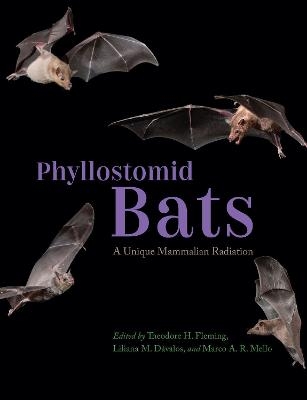
Phyllostomid Bats
University of Chicago Press (Verlag)
978-0-226-69612-6 (ISBN)
Coauthored by leading experts in the field and synthesizing the latest advances in molecular biology and ecological methods, Phyllostomid Bats is the first overview in more than forty years of the evolution of the many morphological, behavioral, physiological, and ecological adaptations in this family. Featuring abundant illustrations as well as details on the current conservation status of phyllostomid species, it is both a comprehensive reference for these ecologically vital creatures and a fascinating exploration of the evolutionary process of adaptive radiation.
Theodore H. Fleming is professor emeritus of biology at the University of Miami, where he worked for thirty years. Among his recent books are Island Bats and The Ornaments of Life, both published by the University of Chicago Press, and No Species Is an Island. Liliana M. Davalos is professor of conservation biology at Stony Brook University. She is coeditor of The Origins of Cocaine and coauthor of the 2016 World Drug Report. Marco A. R. Mello is professor of ecology at the University of Sao Paulo, Brazil. He served as the president of the Brazilian Bat Research Society and is the author, in Portuguese, of Sobrevivendo na Ciencia: Um Pequeno Manual para a Jornada do Cientista.
Section 1 Introduction
1 Overview of This Book
Theodore H. Fleming, Liliana M. Dávalos, and Marco A. R. Mello
2 Setting the Stage: Climate, Geology, and Biota
Theodore H. Fleming
Section 2 Phylogeny and Evolution
3 Phylogeny, Fossils, and Biogeography: The Evolutionary History of Superfamily Noctilionoidea (Chiroptera: Yangochiroptera)
Norberto P. Giannini and Paúl M. Velazco
4 Diversity and Discovery: A Golden Age
Andrea L. Cirranello and Nancy B. Simmons
5 Fragments and Gaps: The Fossil Record
Nancy B. Simmons, Gregg F. Gunnell, and Nicolas J. Czaplewski
6 Phylogenetics and Historical Biogeography
Liliana M. Dávalos, Paúl M. Velazco, and Danny Rojas
7 Adapt or Live: Adaptation, Convergent Evolution, and Plesiomorphy
Liliana M. Dávalos, Andrea L. Cirranello, Elizabeth R. Dumont, Stephen J. Rossiter, and Danny Rojas
8 The Evolution of Body Size in Noctilionoid Bats
Norberto P. Giannini, Lucila I. Amador, and R. Leticia Moyers Arévalo
Section 3 Contemporary Biology
9 Structure and Function of Bat Wings: A View from the Phyllostomidae
Sharon M. Swartz and Justine J. Allen
10 The Relationship between Physiology and Diet
Ariovaldo P. Cruz-Neto and L. Gerardo Herrera M.
11 Sensory and Cognitive Ecology
Jeneni Thiagavel, Signe Brinkløv, Inga Geipel, and John M. Ratcliffe
12 Reproduction and Life Histories
Robert M. R. Barclay and Theodore H. Fleming
13 Patterns of Sexual Dimorphism and Mating Systems
Danielle M. Adams, Christopher Nicolay, and Gerald S. Wilkinson
Section 4 Trophic Ecology
14 The Omnivore’s Dilemma: The Paradox of the Generalist Predators
Claire T. Hemingway, M. May Dixon, and Rachel A. Page
15 Vampire Bats
John W. Hermanson and Gerald G. Carter
16 The Ecology and Evolution of Nectar Feeders
Nathan Muchhala and Marco Tschapka
17 The Frugivores: Evolution, Functional Traits, and Their Role in Seed Dispersal
Romeo A. Saldaña-Vázquez and Theodore H. Fleming
Section 5 Population and Community Ecology
18 Roosting Ecology: The Importance of Detailed Description
Armando Rodríguez-Durán
19 Population Biology
Theodore H. Fleming and Angela M. G. Martino
20 Community Ecology
Richard D. Stevens and Sergio Estrada-Villegas
21 Network Science as a Framework for Bat Studies
Marco A. R. Mello and Renata L. Muylaert
22 Contemporary Biogeography
Richard Stevens, Marcelo M. Weber, and Fabricio Villalobos
Section 6 Conservation
23 Challenges and Opportunities for the Conservation of Brazilian Phyllostomids
Enrico Bernard, Mariana Delgado-Jaramillo, Ricardo B. Machado, and Ludmilla M. S. Aguiar
24 Threats, Status, and Conservation Perspectives for Leaf-Nosed Bats
Jafet M. Nassar, Luis F. Aguirre, Bernal Rodríguez-Herrera, and Rodrigo A. Medellín
Contributors
Index
| Erscheinungsdatum | 04.11.2020 |
|---|---|
| Zusatzinfo | Illustrations, unspecified |
| Sprache | englisch |
| Maße | 216 x 279 mm |
| Themenwelt | Naturwissenschaften ► Biologie ► Evolution |
| Naturwissenschaften ► Biologie ► Zoologie | |
| ISBN-10 | 0-226-69612-X / 022669612X |
| ISBN-13 | 978-0-226-69612-6 / 9780226696126 |
| Zustand | Neuware |
| Haben Sie eine Frage zum Produkt? |
aus dem Bereich


